Q&A: UTEP President Wilson goes deep on the new academic year, plans for expansion
University of Texas at El Paso students bustled through Centennial Plaza on the first day of classes on Monday, Aug. 28, emblematic of a campus revived after a long, hot summer and a dramatic recovery in enrollment after the pandemic.
As Miners rushed to class, UTEP President Heather Wilson sat down with the El Paso Times at a picnic table in the shade just off Centennial Plaza to discuss the beginning of the academic year and check in on projects and progress at the university.
Wilson is entering her fourth year as president of UTEP, prior to which she served as the Secretary of the U.S. Air Force during the Trump administration and as a member of Congress from New Mexico between 1998-2009.
Parts of the conversation — which ranged from discussions about UTEP’s diverse identity to on-campus employment, climate change and a potential law school — have been edited and condensed for clarity.
Please visit elpasotimes.com to review the full interview, which includes more information on Wilson's personal goals, a new advising initiative, and athletics.
More: Welcome back: UTEP celebrates 'success of our students'
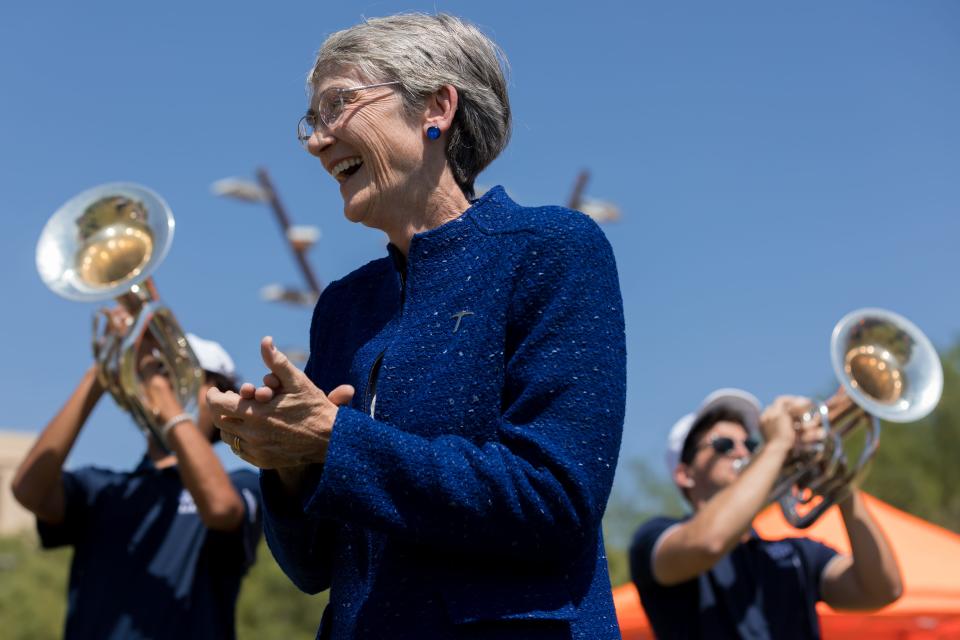
Diversity is ‘woven into the fabric of who we are’
UTEP promotes itself as “America’s Leading Hispanic-Serving University” but recent legal changes on the state and federal level could complicate things. How has the university dealt with the Texas law banning diversity, equity and inclusion (DEI) offices in universities and the Supreme Court’s ruling against affirmative action in June?
Wilson: Let me start out with the federal decision. It has absolutely no impact on UTEP. That probably impacts a very small number of universities who pride themselves on being exclusive, and they mistake that for excellence. That is a tragedy. It’s not a point of pride. UTEP doesn’t make that mistake. So it has no impact at all on UTEP.
At UTEP we try to practice what we call “inclusive excellence,” which means we meet every student where they are. We try to see what their strengths are and then we build on those strengths. No matter who you are, no matter where you come from.
With respect to the Texas law, UTEP doesn’t have a DEI office. Our student body is 95% minority, 84% Hispanic, half of our students are the first in their families to go to college, two-thirds or so come from families making roughly $40,000 a year. We don’t have a DEI office because it is everyone’s job to meet students where they are and help them to succeed as individuals based on their strengths, backgrounds, experiences and so forth.
I actually think if more universities were like UTEP, higher education would have a better reputation in America.
It’s woven into the fabric of who we are. Our mission is to increase access to excellent higher education for every student, no matter where they come from and what their background is.
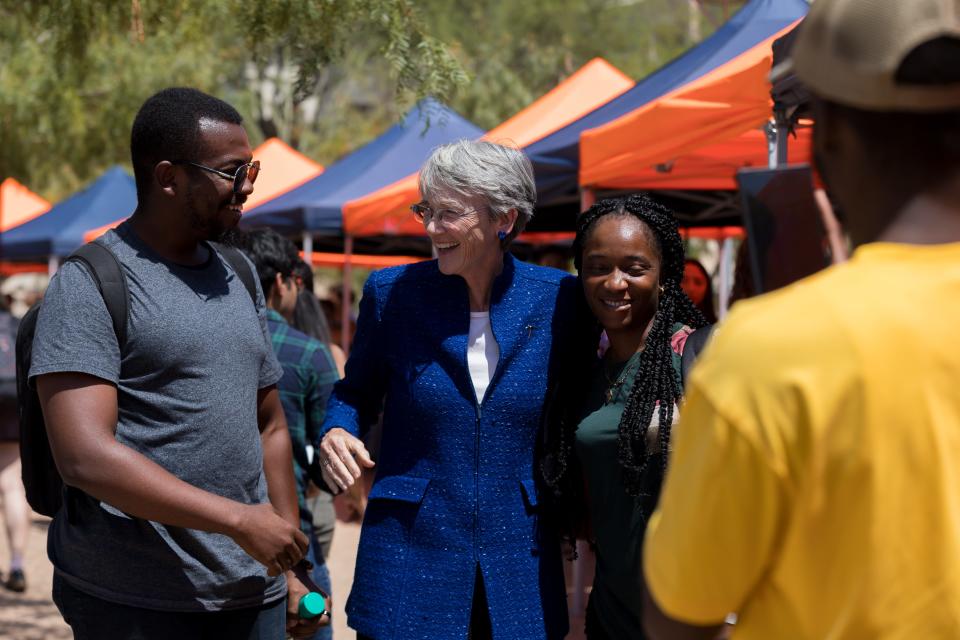
In your Convocation address, you spoke of “high-risk” students that UTEP wants to keep in school. Could you elaborate on what it means to be “high-risk” and what steps UTEP is taking financially and educationally to keep these students enrolled?
Wilson: About eight years ago — and we’ve done research on this for a long time but most recently about eight years ago — we had a grant from the University of Texas system to look at our student body and to do statistical analysis of what are the factors that are likely to help students persist and what are the barriers they face. It’s not just academically. It’s financial, it’s social and it is academic as well.
Risk varies over time. A student may come in as very low-risk because they had, you know, great grades in high school, they’re not working outside the classroom, they’re taking 12 credit hours, they’re engaged. This may change in their second year because their parents lost their jobs — so it’s variable.
We came up with a research based model that predicts student success and student persistence. Our advising approach uses that model to try to increase the likelihood that a student will persist based on who they are as an individual at this moment in time.
As an example, if you’re taking 15 credit hours and you’re working 30 hours a week outside of class, you are at high-risk because all of our data says that’s really hard to do. If I sat down with you as your advisor and I said, “Look if I can get you a $1,000 scholarship, can you cut your hours back down to 20 hours a week? And if we take a three-credit class and move it to the summer, you’d only be taking 12 credit hours — and you’d still be on track, because you’d take a class in the summer.” I’ve now moved you from high-risk to moderate-risk.
The idea is to use this model with every student. Now we have enough advisors so that no advisor has more than 350 students. We use that model to increase persistence to graduation. Last fall we had record high persistence here. I think it was 88% or so. Our objective is not just to have our door open to students but to help them persist to graduation.
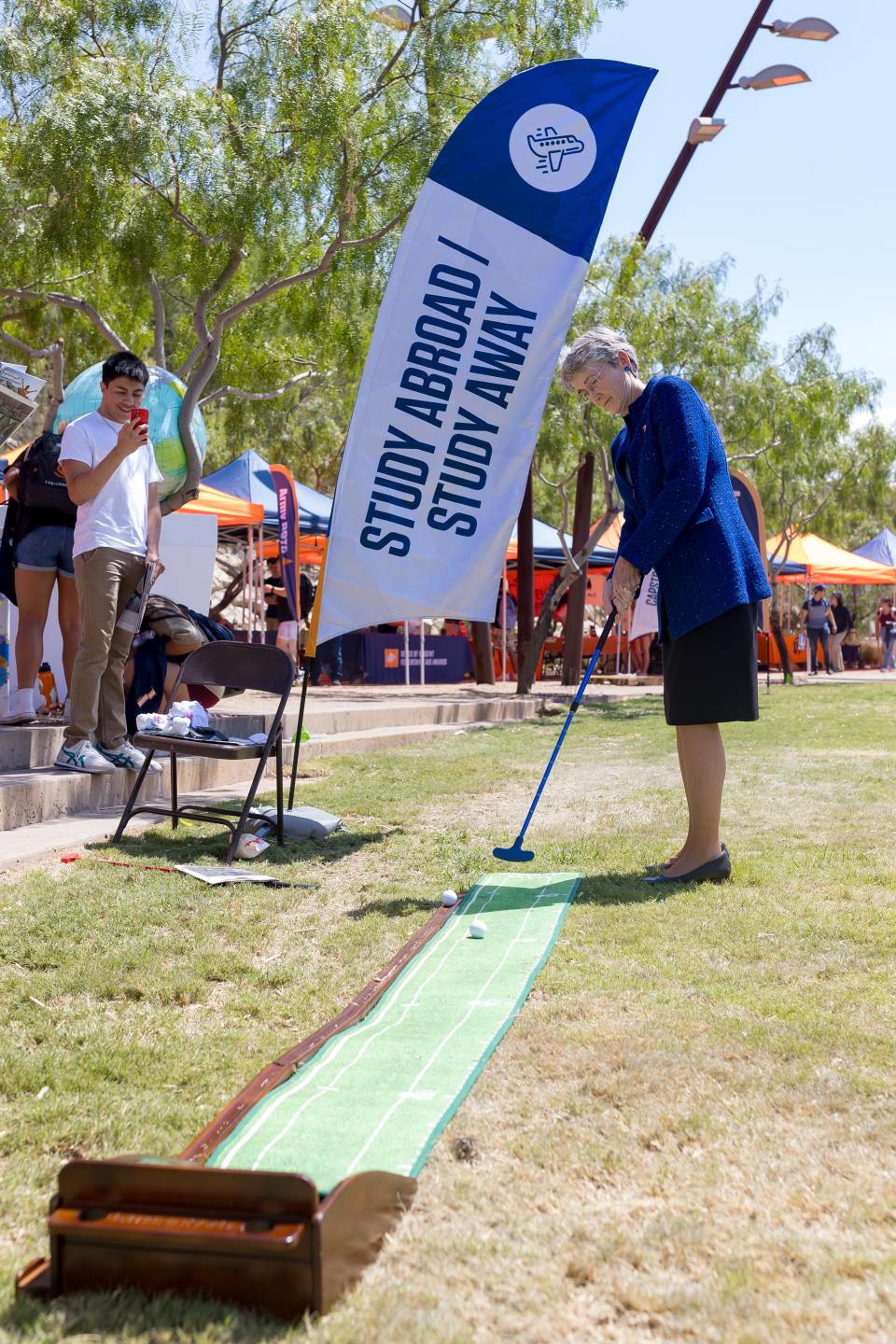
Is persistence somewhat of a new metric? Not a lot of schools use that, correct?
Wilson: That’s right. We’ve been using it here for some time and it’s because of a couple of reasons. The national standard is retention — first year, full-time freshmen to sophomore retention.
Now there are a lot of ways to game those numbers, and we know that universities do. If you, say, were on the cusp of being on the50th percentile of your high school class, your GPA in high school wasn’t all that good, you're working 20 hours a week — we know you’re a high-risk coming in. If we were going to game this, we might say, “Why don’t you start in summer?” or “Why don’t you start part-time?” What I’ve done as a university is exclude you from counting against our university’s numbers.
We don’t do that here. So many students now are swirling through college. Some go back to part-time, some transfer. On this campus, if you just look at the first-time, full-time freshmen cohort, you’re probably excluding half the students. More and more universities are in that circumstance. We want to focus on all of our students and help them to succeed. Persistence counts all students.
You mentioned the new advising initiative. It’s a 1:350 advisor-to-student ratio. Are you looking to move forward with that as well?
Wilson: We are. We want to keep that advising model and continue to deepen it, make sure it works, assess it. It’s again based on research that says, “Let’s take this model and apply it to each individual student on the things that we know help them to persist.”
Some of our research on this, when we look at all the different things you can do with students, there are actually a couple of things that stand out. It’s not hard to increase the persistence of moderate and low-risk students. But for high-risk students, it’s actually pretty hard.
So what works? There are two things that really stood out for high-risk students. One was on-campus employment — we have about 2,700 students in any semester who are employed on campus, and that matters a lot. The second is participation in undergraduate research. That’s something we focus on here, perhaps more than a lot of R1 universities, where it’s mostly graduate students who do research. We have a lot of students involved in undergraduate research, and that’s why — because it helps with persistence.
It helps tether students to campus?
Wilson: It does, but it’s more than tethering. Our Provost John Wiebe tells this story. When he was an undergrad, he worked at McDonalds. Then he got a job cleaning rat cages in the psychology department. Not exactly the most glamorous on-campus job. But he thought of himself differently. He was with the Ph.D. students in psychology. Students who are engaged in research in the field they’re studying think of themselves differently.
The second thing about on-campus employment, it’s true that 70% of our students have jobs, part-time jobs or full-time jobs even. It’s not just that you don’t have to go downtown and figure out how to get back in time for class and the logistics of it, it’s that you’re surrounded by people who are committed to your education in addition to the employment.
We have two students that work in our office, and they come in throw down their bookbags and somebody asks “How was class today?” If it’s coming up on finals week, it’s “Why don’t you make up your hours next week and study this week?” They are surrounded by people who are focused on helping them succeed. The data shows that it’s effective.
In July, the El Paso Times reported that UTEP was facing a six-month accreditation warning status for not complying with standards set by the Southern Association of Colleges and Schools Commission on Colleges, including failing to show that UTEP has enough faculty to support its educational mission. How has the university moved to address this non-compliance?
Wilson: We can give you a statement on that that we released at the time. The report is due on Sept. 8.
So was this a clerical issue?
Wilson: Yes.
More: UTEP faces six-month accreditation warning status for compliance issues
UTEP expanding reach outside of Texas, considering El Paso’s first law school
You remarked that UTEP is expanding its reach outside of West Texas. What kind of different pitch are you making to potential students in regions like Southern California, northern Mexico or East Texas?
Wilson: It’s different. We’d never recruited outside of West Texas before two years ago. People aren’t familiar with UTEP outside of West Texas, really, and Chihuahua.
There’s a couple of things. I think it’s interesting that students from outside of El Paso and their families need to be reassured about safety because the national news covers things related to the border. But this is the fifth safest large city in America. We have to talk a little more about that.
People who grow up here are more familiar with UTEP and what it’s like. So you have to explain “Why UTEP?” a little bit more. With students from out of state, it’s usually more program specific. As an example, if you are in Southern California, it’s sometimes hard to get admitted to a school to study engineering. There are limited slots. You’re guaranteed here to get into engineering. It’s often more program specific.
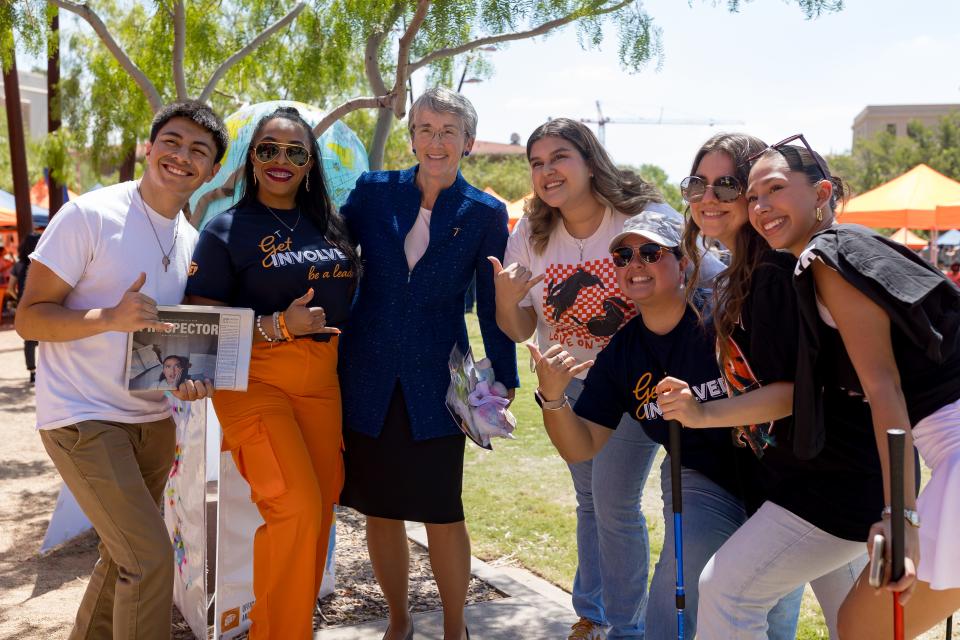
El Paso has no law school. UTEP has long been interested in creating its own. Can you give us an insight into the process of feasibility studies, budgeting and what building a law school from scratch in El Paso would look like?
Wilson: Several legislators have been interested in it, and members of the bar, and they did fund $250,000 in the state budget to do a feasibility study for a law school here.
First of all, we have to look at the demand for lawyers in this region and the demand for a law school. We also need to look at the finances of it. We have a good law school preparatory program here, and a large number of our students are graduating from here and going to the top 50 law schools in the country. We don’t want a law school that’s just where students go if they can’t get in anywhere else.
Part of it is financial to make sure that it’s financially supported by the state of Texas and that there’s enough start-up money there so that we’re not struggling from the beginning.
Second is, what is the unmet need? That can come in a couple of ways. One is areas of focus. There’s one very obvious one, which is U.S.-Mexico law, public and private international law, commercial law.
The other is the way in which we might teach. Most law schools are intense and full-time and during the day. There are a lot of working professionals who would like to get a law degree, but they can’t take that three-year chunk of time. We may look at what Texas offers in that way and see if there’s a need that we can meet.
Do you feel like there is an unmet need? El Paso has no law school at the moment.
Wilson: It’s true. The question is, do we have enough lawyers? There’s some indication that we don’t in West Texas. The study will tell us that.
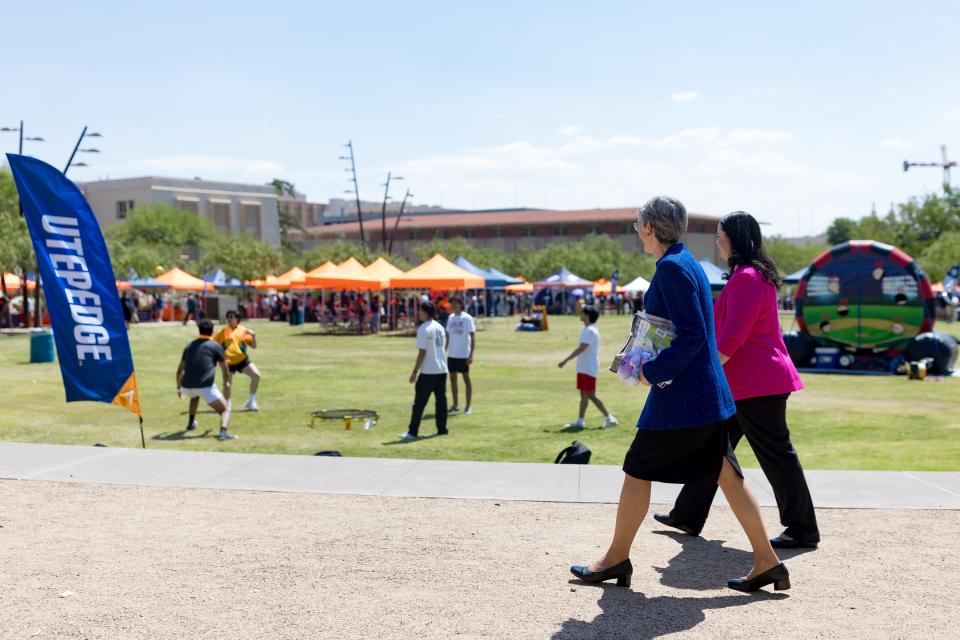
Newly funded Hunt College of Business to focus on U.S.-Mexico trade
UTEP received its largest single gift in history to fund the newly named Woody L. Hunt College of Business. How has this $25 million been used, especially regarding the goal of becoming the first business school with an expertise in studying U.S.-Mexico trade?
Wilson: The gift comes in over eight years, so it doesn’t all start immediately. But we are recruiting faculty this year. There’s one on supply chain. I’m not sure it’s this year, but there’s another that is in the program on international business law. Most of it’s for faculty. There’s some student support and things. We’re also trying build on that gift to fill in some of the other gaps to make it even stronger.
What would the U.S.-Mexico focus look like from a binational perspective?
Wilson: It’s actually interesting. We’ve now got the interim Dean of Business [John Hadjimarcou] and other faculty working on “How is this gift going to change the way we teach, not just in these additional courses offered but throughout our curriculum?” so that a student who really wants to do U.S.-Mexico business can take a program here where a lot of it is relevant.
They’re looking at that and they’re looking at what other things would make this even better. As an example, increasing the number of internships and short experiences that we have at the maquilas or with companies that specialize in U.S.-Mexico trade.
Most businesses schools including us teach using the case study method. But those cases aren’t necessarily specific to this region. As an example, could we fund a position where somebody specifically works with faculty to write the cases for this region? So instead of an international trade case that you’re studying on some company in Toronto, it’s relevant to here. That’s particularly important given the uniqueness of law in Mexico.
That could require a lot — changing textbooks, changing curriculum, changing faculty who you hire ...
Wilson: Exactly, and it’s the new faculty we hire but it’s also how do we weave this into more of our course work and our co-curricular work to just make sure it’s strengthened across the board.
You’re still going to be able to get a great accounting degree here or a specialty in real estate here, but there are we want to be the best in the country at our business school in U.S.-Mexico trade and business. How are we going to do that? They’re now into the details of that planning.
Opinion: What could Hunt’s $25 million gift mean for UTEP?: Oscar J. Martínez and Carmen E. Rodríguez
Four years on, Wilson building ‘a depth of trust’ on campus
You have been at UTEP since 2019. How has this role changed you, and how have you changed how you operate as President in the past four years?
Wilson: Well, I didn’t plan for a global pandemic my first year. I think that probably changed all of us and our leadership styles. One of the things as a leader, when things are hard or people are dealing with really big challenges, it’s really important to be out and engaged and communicating with people — and that was exactly what we couldn’t do. Learning to use new tools and techniques and technologies to stay engaged and stay connected — but it still was very difficult.
I think it was very difficult on everybody, but it certainly was hard as a leadership team to shift a 25,000-student university to completely virtual learning in 10 days. When you had no choice, people just stepped up and did it. We got Wi-Fi pucks and computers for 3,000 students who didn’t have them. We figured out how to do it by increasing our cost of attendance so it would be reimbursable under Pell Grants to get the technology out to students so they didn’t fall behind. It was pretty amazing. You know that scene in “Apollo 13” where they throw a bunch of junk on the table, and you’ve got to make a carbon dioxide filter out of it? It felt that way.
One of the consequences was that we all got used to saying “We have no clue. Let’s figure this out.” That actually built a depth of trust in teamwork as well, where people feel comfortable saying, “I have no idea, but let’s figure this out. Let's see what we can do.” I think we learned a lot from those experiences and what people are really capable of. It made us perhaps more comfortable with change, which is not something universities are generally very good at.
We’re now a few years out of the pandemic. Could you evaluate how UTEP’s recovery is faring?
Wilson: It’s doing actually really well. When we came back, one of the things we said is that we value in-person education, which our students had lost a lot. Tenure-track faculty must have a meaningful on-campus presence. I was talking to somebody in town here whose daughter is going to school out of state, and they are still almost completely virtual. Gosh, I just — I could not handle that myself. We are very social critters, and that human interaction is what matters.
I have to say that we have seen an increase last year and again this fall in students who have to take developmental English and developmental math. There was a significant learning loss for these students when they were in high school, when they were learning by distance for two years. Again, that’s okay — we’ll meet them where they are and help them to succeed.
The El Paso region is coming off a record-breaking hot summer. How are you steering UTEP’s policies and campus infrastructure to adapt to climate change in the borderlands?
Wilson: There’s not too much on the policies on campus. Our buildings are actually very energy efficient for a big campus.
We have expertise here in both climate science and … water and arid lands research. We do research here and we study the environment and water and systems and applications.
More: Hello rain! El Paso's scattered showers provide reprieve from months of record summer heat
The Kay Bailey Hutchison Desalination plant is the largest inland desalination plant in the United States. El Paso Water, 20 or 30 years ago, started really doing innovative things on desalination, water reuse, closed water systems in order to reduce groundwater use and not constrain the development of West Texas. What’s done in this city on the planning for water reuse is some of the most cutting-edge stuff in the country, and a lot the faculty here have been involved with El Paso Water.

Aside from University goals, what are your personal and professional goals for the year ahead?
Wilson: They’re one and the same. As a leader, over time it’s gotten more simple rather than complex. I’m values-driven and mission-focused and people-oriented. If I do those three things, decisions tend to come out a little better.
Values in the different institutions I’ve been a part of, sometimes they’re a little different, but in all of them, two have been common. One is integrity, and the other one is a commitment to excellence. Without those two things, it’s not an organization I want to be part of.
Mission-focused — we are here because of the mission. If we’re doing something today that doesn’t advance the mission, then we’re wasting our time. It has to be about our mission, and our mission is very, very clear: increasing access to excellent higher education, advancing discovery of public value and positively impacting the health, culture, education and economy of the community we serve. That’s a clear public university mission.
And then, people-oriented. The most valuable thing that we have here is our faculty and staff. If our faculty and staff are valued and engaged, passionate about what they do, if they are well prepared and passionate, there’s almost nothing I can do to screw this up.
Is there anything else you would like to highlight about the upcoming year that we didn’t have a chance to talk about?
Wilson: Probably the most important thing for the students is the mandatory tuition and fees will be flat this year and next year. That's a commitment from the taxpayers to the Legislature and also the UT-system Board of Regents. That was negotiated with the Legislature, so they increased the state contribution to education. Because of that we were able to keep tuition and fees flat. That is really, really important to our students.
The other one is, I’m sitting here looking at this building built in 1960. Pretty much every student here that ever graduated has had at least one class in that building. That’s the Liberal Arts Building. It needs to go away. It’s well beyond its useful life.
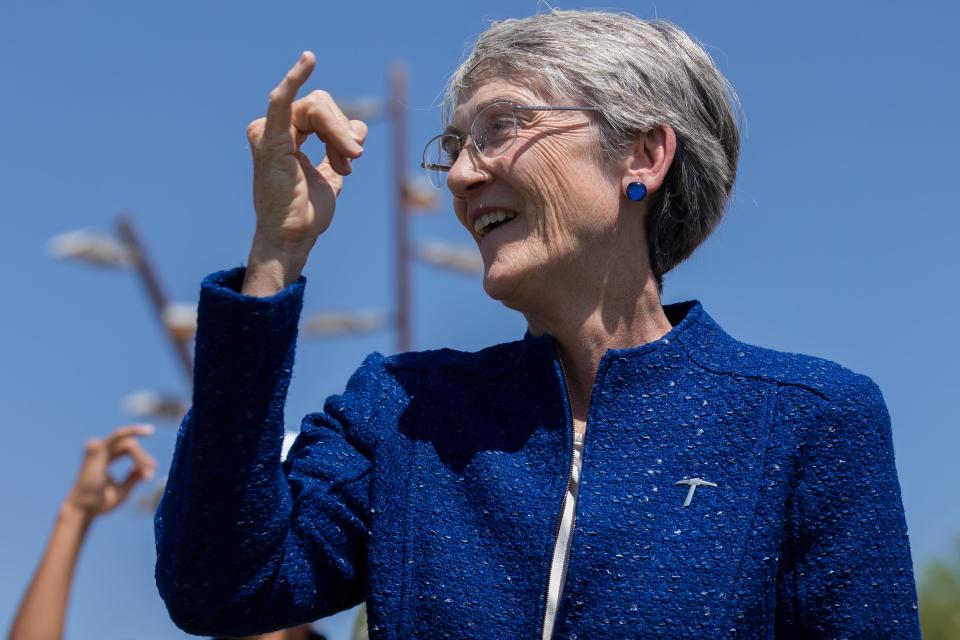
We took the legislators through that building and showed them some of the things that normally we would not want to show people — I mean we have this gorgeous campus, right? But I brought them through that building and I said, I want you to see this. They funded half the building, and the UT system and the oil and gas revenues funded the other half. It’s a $110 million building. That old building was built without air conditioning, too. All the air conditioning was retrofitted. It’s not good. There were no elevators — pretty much everyone here will cheer when that goes away.
But fortunately, the Legislature and the regents saw that … there are 107 buildings here, and we need to make sure we use space really, really well, and that we maintain it. Because if we don’t, we’re pushing costs onto future students — it’s more expensive to let things degrade and then have to restore them than it is to maintain them.
But other than that, not much going on!
Athletics
Wilson's responses to questions about UTEP athletics were delivered in an emailed statement on Friday, Sept. 1.
You have described UTEP athletics as “the front porch of the institution; they are one of the ways a community and the university connect with each other.” Are you happy with the caliber of your sports programs, specifically football and men’s and women’s basketball?
Wilson: Thousands of people engage with UTEP every year by coming to a sporting event and cheering for the Miners. We value that connection to the “915”.
Our football program has certainly come a long way. We were 1-11 four years ago. We went to a bowl game in 2021, and we were one win away from bowl eligibility in 2022. We beat a 10-win Boise State team last year, and we nearly upset the best team in Conference USA at their place.
Our basketball programs are in good hands with Joe Golding and Keitha Adams. Joe had to rebuild his team last year and they struggled. This year, they’ve returned a nice nucleus of players and brought in some talented transfers and freshmen.
Keitha won at an extremely high level the first time she was here, and there’s no reason why she can’t do it again.
There are a lot of positive things going on with our other sports programs. For example, volleyball just knocked off a PAC-12 power, Washington, and may have its best team ever.
In May 2022 UTEP athletic director Jim Senter told the El Paso Times that “We have a long way to go and work to do to become 100 percent totally compliant with Title IX and gender equity.” In the past year, how much work has been done? And what specific actions will UTEP be taking to become Title IX compliant?
Wilson: The addition of the beach volleyball program was our most recent step. Our total number of scholarships for beach volleyball will continue to grow in the next few years until we are fully funded. We continually evaluate our athletics programs for compliance and will continue to do so.
UTEP’s newest sport is women’s beach volleyball, which had its first season this spring. Due to a lack of facilities, UTEP beach volleyball hosted no home games. Are you doing right by these student athletes by not having adequate facilities to host a match? And what progress has been made in filling this gap?
Wilson: The beach volleyball team practices on-campus at two sand courts near the varsity soccer field. The decision on where to have the courts needed to host matches on campus will be made when the updated campus master plan is complete in early 2024.
Could you provide an update on creating a competitive Name, Image, Likeness (NIL) agreement for UTEP student athletes?
Wilson: Texas law only recently changed, permitting institutions to interact with collectives and other third-party entities. The Texas law is not completely aligned with NCAA rules and we are evaluating how best to implement this. I am aware that a collective was organized that is dedicated to men’s basketball. A Name, Image, Likeness collective for football would require someone in the community leading it.
We have an agreement with Brandr, which works directly with our student-athletes to sell apparel. Internally, we are informing our student-athletes on what they can and can’t do under NCAA rules and Texas law.
The NCAA is undergoing extensive conference realignment. Is UTEP looking for an opportunity to leave Conference USA and join a more regionally focused conference like the Mountain West?
Wilson: Our goal is to compete for and win championships in Conference USA.
This article originally appeared on El Paso Times: Q&A with UTEP President Heather Wilson

